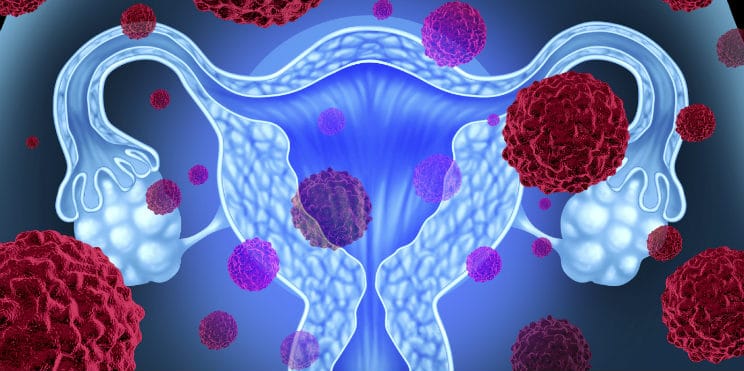Early detection and diagnosis are the best ways to beat uterine cancer, so familiarize yourself with the signs and symptoms now.
Uterine cancer occurs when normal cells begin to reproduce uncontrollably and form a mass called a tumor, which cause uterine cancer symptoms like bleeding and pelvic pain. Not all tumors are malignant (meaning they are able to spread to other parts of the body), some are benign and do not spread.
Uterine cancer is the most commonly diagnosed gynecologic cancer, and more than 70% of cases of endometrial cancer are Stage l at the time of diagnosis. When it’s caught during Stage l, uterine cancer has a reported 90% 5-year survival rate. Pay attention to your body for any early warning signs to catch uterine cancer as early as possible.
What Are the Symptoms of Uterine Cancer?
There are a few symptoms or uterine cancer you can watch for early on. Women with uterine cancer may not experience all of these symptoms, and some women may experience none of them:
- Unusual vaginal bleeding, discharge or spotting
- Pelvic area pain
- Visible or tangible pelvic lumps
- Rapid weight loss
- Pain or difficulty while urinating
- Unusual pain during intercourse
If you are experiencing any of these symptoms, make an appointment with your gynecologist as soon as possible. Keep a record of how long and how often you have been experiencing these symptoms to help your gynecologist order the tests needed to make an accurate diagnosis.
Am I at Risk for Uterine Cancer?
Certain risk factors can increase your chances of developing uterine cancer. Knowing whether you are at a higher risk of developing uterine cancer can help you make informed decisions, like scheduling regular cancer screenings or making important lifestyle changes. Common risk factors for uterine cancer include:
Age – Uterine cancer is more likely to occur in women over the age of 50.
Obesity – The fatty tissue in overweight women produces additional estrogen, which increases your risk of uterine cancer. About 40% of uterine cancer cases are linked to obesity.
Genetics – Uterine cancer often runs in families. It is also more common if your family has a history of colon cancer.
Other health conditions – Other conditions, like endometrial hyperplasia and diabetes, can increase your risk of uterine cancer.
Other cancers – Previous battles with breast, colon, or ovarian cancers put you at increased risk of developing uterine cancer.
Tamoxifen – The drug tamoxifen (Nolvadex) is often used to prevent or treat breast cancer, but may additionally increase your odds of developing uterine cancer.
Radiation therapy – Previous radiation treatments focused on the lower part of the abdomen can increase your risk of uterine cancer.
Estrogen – An imbalance in, or increased exposure to, estrogen may increase your risk of uterine cancer. This includes women who started their menstrual cycles before age 12, those who go through menopause later in life, those who participate in hormone replacement therapy (HRT), and those who have never been pregnant.
If you have concerns about your symptoms or risks for uterine cancer, talk to your gynecologist about uterine cancer screenings. They will help you determine your risk factors and advise a preventative treatment plan.
Benign Uterine Tumors
If a mass is found in your uterus, your gynecologist will determine the kind of cells making up the mass with a biopsy. If the tumor is benign then you do not have uterine cancer. There are several benign uterine tumors that can mimic the symptoms of uterine cancer, including:
Fibroids – Fibroids are benign tumors found in the uterine muscle.
Endometriosis – A noncancerous condition in which endometrial tissue, like the tissue in the uterine cavity, spreads to the outside of the uterus or other organs.
Endometrial Hyperplasia – A noncancerous condition in which there is an increased number of cells within the uterine lining.
If you are diagnosed with a benign uterine tumor, your gynecologist will help you come up with an appropriate treatment plan.
Cancerous Uterine Tumors
If you are diagnosed with uterine cancer, it can be caused by one of two types of uterine cancer:
Adenocarcinoma – More than 80% of uterine cancers are adenocarcinomas, which develop in the lining of the uterus and are also known as endometrial cancer.
Sarcoma – A uterine cancer that develops in the uterine gland tissues or within the myometrium tissues and makes up 2%-4% of uterine cancers.
Uterine cancer is a serious disease, but there are treatment options, including radiation therapy, chemotherapy, and surgery.
If you are experiencing uterine cancer symptoms, contact The Woman’s Clinic at 501-664-4131 to schedule an appointment with one of our experienced and compassionate gynecologists.

